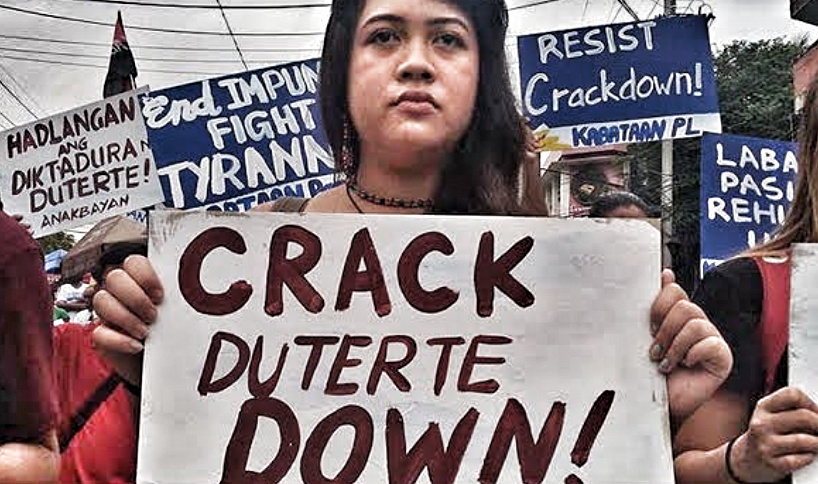
It is quite ironic that the biggest “crime” today’s Opposition accuse the incumbent government of Philippine President Rodrigo Duterte of is to invite the Chinese government to exert undue influence on the Philippines. The fact is that a key element of the Opposition — Filipino communists and their puppet organisations in the Philippines’ university campuses — were the first to extend a welcome mat to the People’s Republic of China.
A report on militant organisations published on the Stanford University website describes how the Communist Party of the Philippines (CPP) is founded on the premise that China is the source of both ideology and resources to effect violent revolution in the Philippines. The report also shows the history of the CPP’s lame efforts to solicit support from other terrorist organisations around the world.
From its 1969 establishment until the 1976 normalization of Philippine-Chinese relations, the CPP-NPA received support, weapons, and funds from China. However, even though the CPP-NPA modeled its armed struggle on China’s own Maoist movement, Chinese support for the CPP-NPA seems to have been limited. The CPP-NPA also sought support, weapons, funds, and training from like-minded groups overseas, including the Japanese Red Army (JRA), the Maoist factions of the Palestinian Liberation Organization (PLO), the Sandinistas, the Communist Party of El Salvador, and many other organizations…
Most disturbing of all is the account of the Stanford report of events that sealed the record of the CPP and its terrorist arm, the New People’s Army (NPA) as an enemy of the state as well as the baffling way that its current ally, the Liberal Party (today known as the Yellowtards), contributed to the twisting of facts that led to a confused record of these events.
In February 1971, [CPP founder Jose Maria] Sison met with CPP-NPA Central Committee members to discuss his plan to attack a Manila rally of the Liberal Party, which opposed President Marcos. The purpose of the attack was to provoke another government crackdown and ideally gain support for the CPP-NPA. On August 21, three CPP-NPA members threw four grenades onstage at the rally in Manila’s Plaza Miranda before fleeing the city to a CPP-NPA camp.
Even back then, the confused nature with which the Philippines’ political leaders respond to clear acts of terrorism was on exhibit. Rather than be unified across partisan interests in condemning a bald atrocity perpetrated by a Cold War enemy the Liberal Party, instead, blamed the attack on the government of then President Ferdinand Marcos.
Liberal Party members blamed President Marcos for the attack, which had killed much of his opposition. Marcos, who blamed the CPP-NPA for the bombing, responded by suppressing leftist political activity and suspending habeas corpus. These measures marked an increase in Marcos’ power. In response to Marcos’ repression, hundreds of student recruits joined the CPP-NPA. [27] [28] Meanwhile, Sison denied that the CPP-NPA had been involved in the attack.
Things haven’t changed much in the last half-century since.
Today, it is interesting how the current Yellowtard-led Opposition, its lackeys in Big Corporate Media, and its circle of so-called “activists” dishonestly water down the nature of the CPP-NPA as terrorists and enemies of the state. They denounce “red tagging” of leftist groups as a “ploy” perpetrated by the government to endanger the lives of members of these leftist groups. However there has been no categorical denial of links between the CPP-NPA and these so-called “leftist” groups coming from any of their leaders. The same Stanford report, for example, describes current party-list group Bayan Muna as “a political party connected to the CPP and other groups in the Communist movement.” According to a recent ABS-CBN News report Bayan Muna is part of the Makaybayan bloc of left-leaning party-lists that include “Gabriela, Kabataan, Anakpawis, Migrante, and Alliance of Concerned Teachers.” Like most other mainstream reports and discussion surrounding these “leftist” organisations, the report stops short of describing these groups as being linked to the CPP and the terrorist NPA.
To be fair, the ABS-CBN News report includes statements from Davao City Mayor Sara Duterte-Carpio who “called on Congress to expel members of Makabayan bloc at the House of Representatives, saying it has become ‘the milking cow of terrorists’.”
Indeed, another party-list group Akbayan — a current Liberal Party ally — was cited in a GMA News reportas having origins that “can be traced to the division of the Communist Party of the Philippines and its allies in the 1990s. Akbayan was formed by those who refused to be associated with both factions.” Yet in its “Brief History”, Akbayan is dishonestly mute on that otherwise noteworthy aspect of it history…
After twenty years of dictatorship under the Marcos regime, formal democracy in the Philippines was restored in 1986 through a broad “people power” movement. This democracy, however, proved to favor only the political and economic elite of the country. The moving force behind the anti-dictatorship struggle–concerned citizens and progressive groups–has been relegated to the periphery of decision-making and policy implementation. In response, social movements, trade union groups, and political organizations have emerged to challenge state policies through lobbying and pressure politics.Despite the dynamism of Philippine movements, formal institutions of democracy remained in the hands of the few and the wealthy. It was within this context that the idea of building an alternative, a citizens’ political party, first emerged. Social movement groups wanted to be part of the formal processes of government. Akbayan was thus conceived as an effort to institutionalize people power and thereby deepen Philippine democracy.Consultations on the party-building project began in 1994. Throughout the country, pro-democracy groups were enjoined to help shape the party concept and strategy. Aspirations of various sectors–labor, peasants, youth, women, gay and lesbians, professionals, overseas Filipino workers, urban poor–were discussed and consolidated into a program of governance, while ad hoc structures were formed in Luzon, Visayas and Mindanao. Four years later, in January 1998, Akbayan was formally established through its Founding National Congress. In May of the same year, the new party tested its strength by participating in the local and party-list elections and won seats in the House of Representatives, and several local government units.
One could understand now why the current Opposition had lost an entire nation in 2016 (and had become today’s Opposition) and, in the lead-up to this year’s election, continues to lose. The Opposition have not learned important lessons. It continues to campaign on the back of personalities rather than ideas and is flagged by a coalition — laughably branded the Otso Diretso team — that essentially stands for nothing of consequence. Worse, the broader Opposition is stained by both the Yellowtards and the crooked stigma of Philippine communism. At a time when Filipinos need direction to navigate their new-found economic prosperity, the Opposition are, instead, hooked on irrelevant disaster-mongering.

The biggest enemy of economic prosperity is political instability. It is quite bizarre that an entire Opposition campaign would be constituted around pitching — and even inciting — that wealth-killing instability. Worst of all is the manner with which the Opposition is in bed with the most nefarious antitheses of the principles that underpin the unprecedented wealth being created in the Philippine economy today — communism.
If the Opposition want to remain relevant, they will need to seriously re-invent themselves by ditching the tired and downright dangerous rhetoric that fuels their doomed campaign today — the victim mentality of the Yellowtard narrative, the Cold War violent revolution espoused by the communists, and the perverse Filipino brand of liberalism that devalued the erstwhile noble concepts of “human rights” and “equality”. To win back the Filipino people, the Opposition will need to be demolished and re-born and their links to communist terrorists dissolved.

No comments:
Post a Comment